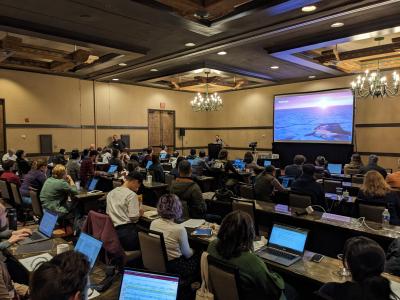Advancing Marine Arctic Science through Facilitating International Collaborations
The Consortium for the Advancement of Marine Arctic Science (CAMAS) held its inaugural workshop and early-career school in Santa Fe, New Mexico, from 13 to 16 February, 2024.
The event brought together 80 marine Arctic scientists from around the world to discuss current research and to develop ideas for collaborative research projects that can be executed in the next few years to advance our understanding of the marine Arctic system. Nine collaborative projects have been proposed so far, and interdisciplinary teams started work on these projects. The early-career school enabled 35 postdocs and students to enjoy lectures from experts in the field, and to receive hands-on training in the use of the benchmarking package PMP (PCMDI Metrics Package).
The Arctic environment is changing rapidly. Numerical models that accurately capture key processes in the Arctic Earth system are critical tools for understanding the drivers of these rapid changes and for anticipating their consequences. Arctic Earth system modeling has made significant progress in the past decades, but many challenges remain, as the pace and scope of Arctic change seem to elude even the best models. CAMAS aims to advance the understanding and model representation of key marine Arctic processes that contribute to the rapid changes in the Arctic, by facilitating and enhancing international collaboration on marine Arctic science. In particular, CAMAS focuses on the following themes:
• Drivers and impacts of ocean heat and freshwater transport into and out of the Arctic
• Ocean–ice–atmosphere interactions in a warming Arctic
• Biophysical impacts of Arctic marine biogeochemistry
The inaugural CAMAS workshop brought together 80 scientists from around the world to discuss the current state of knowledge, and to develop ideas for collaborative research projects that would advance our understanding of the marine Arctic system. Nine collaborative projects have been proposed so far, and interdisciplinary teams have started to work on these projects (see here for a list of projects: https://www.hilat.org/camas-projects.html). An early-career school preceded the workshop. Thirty-five postdocs and students enjoyed lectures from experts in the field and received hands-on training in the use of the benchmarking tool PMP (PCMDI Metrics Package).
The objective is to organize at least two more workshops, with the next event being planned for April 14-18, 2025 in Seattle, WA.

